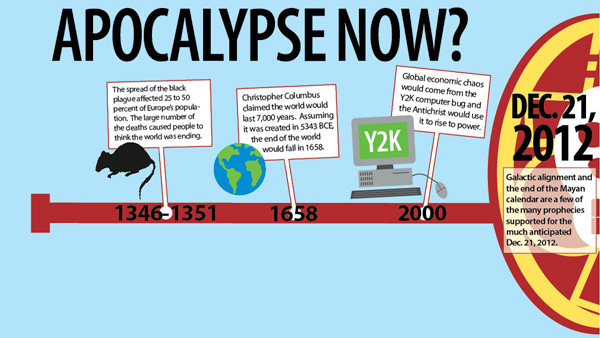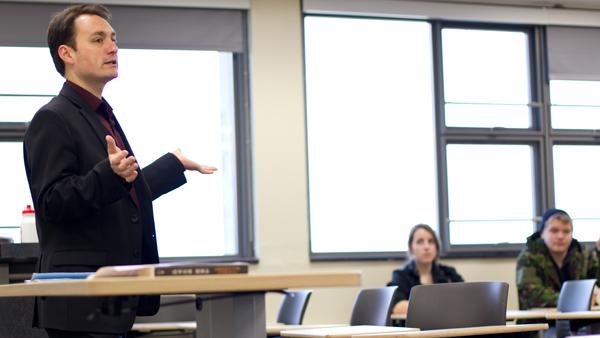
The countdown has begun. It’s not to the end of finals but potentially to the end of the world.
Some have predicted, based on the conclusion of the Mayan calendar cycle, that the world may come to an end in eight days, on Dec. 21, 2012. While some are bracing for the potential apocalypse, many are working to discredit the theory.
Around the world, people are bracing for what is believed to be the apocalypse on Dec. 21. In western Turkey, thousands are pouring into a small village where Christians believe the Virgin Mary ascended to heaven. In the U.S., some believers are ready to run to sophisticated underground bunkers to survive a possible catastrophe.
At Ithaca College, some professors have brought doomsday discussions to the classroom. Ron Denson, assistant professor of writing, has taught the honors course, “2012: The End of Time,” for four years. His class focuses on Mayan culture and the famous calendar that ends in 2012 and has managed to spook — at least a little — an entire generation.
“There is this sort of inchoate fear that the end of the world is happening, and [students] don’t quite know where that sense comes from,” Denson said.
Michael Richardson, associate professor of modern languages and literatures, teaches the freshman Ithaca seminar, “Disaster and Dystopia and the End of the World.”
“There’s always a perverse sort of fascination with the end of the world, and some of that comes from a dissatisfaction with the way that society or civilization as a whole is headed,” Richardson said.
This is not the first time the world has been prophesied to end. There have been more than 150 predicted apocalypses. On Dec. 21, 1954, according to a UFO cult, the Brotherhood of Seven Rays, an epic flood was supposed to destroy the world. On Jan. 1, 2000, the Y2K computer bug was supposed to cause global chaos. If all doesn’t fail next week, there are more dates in the future. According to Jeanne Dixon, a 20th-century astrologer, Armageddon will take place between 2020 and 2037.

This year, some people are expecting a planet or brown dwarf called Nibiru, Planet X or Eris to hit planet Earth, which will cause widespread destruction — a prediction originally scheduled for May 2003. When nothing happened in 2003, it was moved to December 2012 and linked to the conclusion of the Mayan calendar. Other theories include meteor strikes, massive natural disasters and the shifting of north and south poles.
Despite the many claims of world doom, NASA is reassuring civilization on its Earth FAQ page that the world will not end Dec. 21.
“Our planet has been getting along just fine for more than 4 billion years, and credible scientists worldwide know of no threat associated with 2012,” the website states.
Back in Denson’s classroom in the Center for Natural Sciences, most students are not devout believers of apocalyptic predictions. However, some took the course hoping for official proof they would be alive and well after college finals end Dec. 21, sophomore Tom Dempsey, who is taking his class, said.
“They were in there to get confirmation from an instructor that this was false,” he said.
Scholars agree. John Henderson, Cornell University professor of anthropology and Mayan calendar expert, said he does not expect this month to be the last of humanity; the calendar simply marks the end of one of its cycles.
“I like to take the view that the ancient Mayas took, and that is that sometimes people fell so far short of what the Gods would have liked that they have to be redone,” he said. “And so maybe it would be a healthy thing to think about whether we are falling short of what we would like to be or what the Gods would like us to be.”
“Falling short,” as Henderson puts it, is popular among “doomsday preppers” who are actually preparing for social unrest and other global catalysts caused by human mistakes.
While many may or may not be bracing for a total worldly demise, thousands of Americans have been preparing for any range of disasters, be it economic or natural.
What is referred to as “prepping” has been brought to media spotlight recently by National Geographic’s documentary series, “Doomsday Preppers.”
Though not necessarily for the next projected end of Earth, preppers are braced for any number of disasters. Tom Martin, founder and vice president of community development for the American Preppers Network, said prepping has become more common after the Great Recession, Sept. 11 attacks and natural disasters like Hurricane Katrina and, most recently, Hurricane Sandy. Martin said everyone should be prepared in some sense.
“It’s a movement that spans all political philosophies, all religious philosophies. It doesn’t matter your race or your gender or your economic status, everybody should be interested in getting prepared,” Martin said.
Anxiety about any type of calamity is often reflected in American pop culture, Richardson said. Every time period has had a particular type of social apprehension, such as that seen during the ’70s and ’80s for a nuclear holocaust or in the ’90s for a robot takeover. Most recently, zombies have taken the spotlight with shows like “The Walking Dead.”
“If you look at zombie movies as a genre, there is a particular kind of anxiety that is being expressed, whether it’s an anxiety about people living too long or whether it’s an anxiety because people are living too long [that] our bodies are deteriorating more,” Richardson said.
In fact, zombies have become so popular, the Centers for Disease Control and Prevention have actually posted tips on how to survive a zombie apocalypse and what the CDC’s plan of action would be.
“If zombies did start roaming the streets, CDC would conduct an investigation much like any other disease outbreak,” the blog states. “CDC would provide technical assistance to cities, states, or international partners dealing with a zombie infestation.”
Panic about the extermination of civilization is not completely rooted in fear, Richardson said, it is sometimes seen as a chance for a fresh start.
“I know that sounds strange, but it almost doesn’t seem like they are worried about the end of the world,” he said. “It seems like they are looking forward to the end of the world.”
Disaster anxiety has lead many to spend big on preparations. CNN has found people who have spent more than $350,000 on prepping. However, while one of the principles of preparedness, according to the APN, is to “have a year’s supply of every needful thing,” they advise people to be self-reliant and sustainable in their purchases and preparedness.
Besides preparing, some are instead choosing to spend their potential last days in paradise, closer to the site of the predictions. According to Skyscanner, an airfare finder, one-way flight bookings have increased for Dec. 21.
However, over-the-top spending and cashing in on the apocalyptic craze can overshadow true Mayan culture. Sophomore Matthew Brooks visited Belize through a Maya research program with the University of Texas. While working at an excavation site near Blue Creek, he met Mayans who expressed their concern with the misinterpretation of their culture worldwide.
“There is profit involved in this; the Guatemalan government is going to be having a doomsday celebration,” Brooks said. “The profit will be going to the Guatemalan government but not to the Mayans, yet they are utilizing the Mayan culture, and on top of that utilizing it wrongly. So not only is it disrespecting the Mayans, they’re not even giving them their cut, and that’s screwed up. That is bad business; it’s immoral, ethically wrong on so many levels.”
Despite the hype, Henderson said there is most likely no cause for alarm.
“The only astronomical thing that is surely going to happen on the 21st is Winter Solstice,” Henderson said. “It happens every year.”
To view an interactive timeline of predicted ends of the world, visit the interactive.








